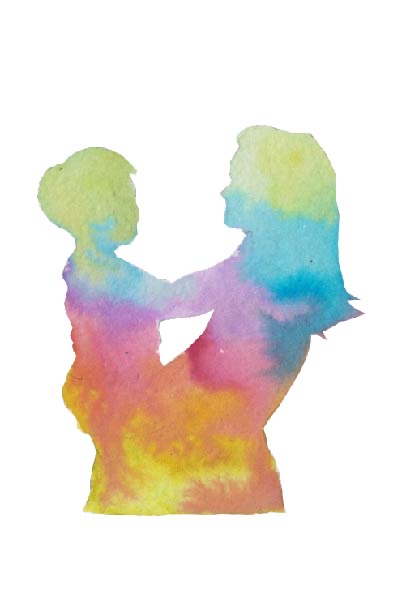
I feel fear, anxiety, light trembling in my body and then the tears come. I give way to them and remain embracing myself; I am here for the little girl inside who feels sadness.
As if she were slowly disappearing in the ocean of tears, and I take her into my arms and say: “It’s alright, do cry, I am here with you, you can feel what you feel,” and in my mind I just rock her. And my body is actually rocking.

It is here with me, a small sad part of myself, my inner little girl who just a few years back would not be fully able to get to the surface.
At the time I still did not have the capacity to be there for her whenever she needed it. I would rather opt for defence, thinking I’d manage everything. I worked a lot, did many things for others, making everybody happy, I did not want to “fully” feel some parts of myself.
In such situations, when my inner little girl felt anxiety and asked for attention, I gently smiled or even joked, so I wouldn’t have to cry and open up to this pain.
Yet, in the retrospect it did not need that much. Just to be aware of her and listen to her regularly. Then the emotion does not have to push its way to the surface.
Now she’s here with me, she can paint, dance, write or just be with me any time she likes. My inner child, my suppressed emotions that once froze in my body.
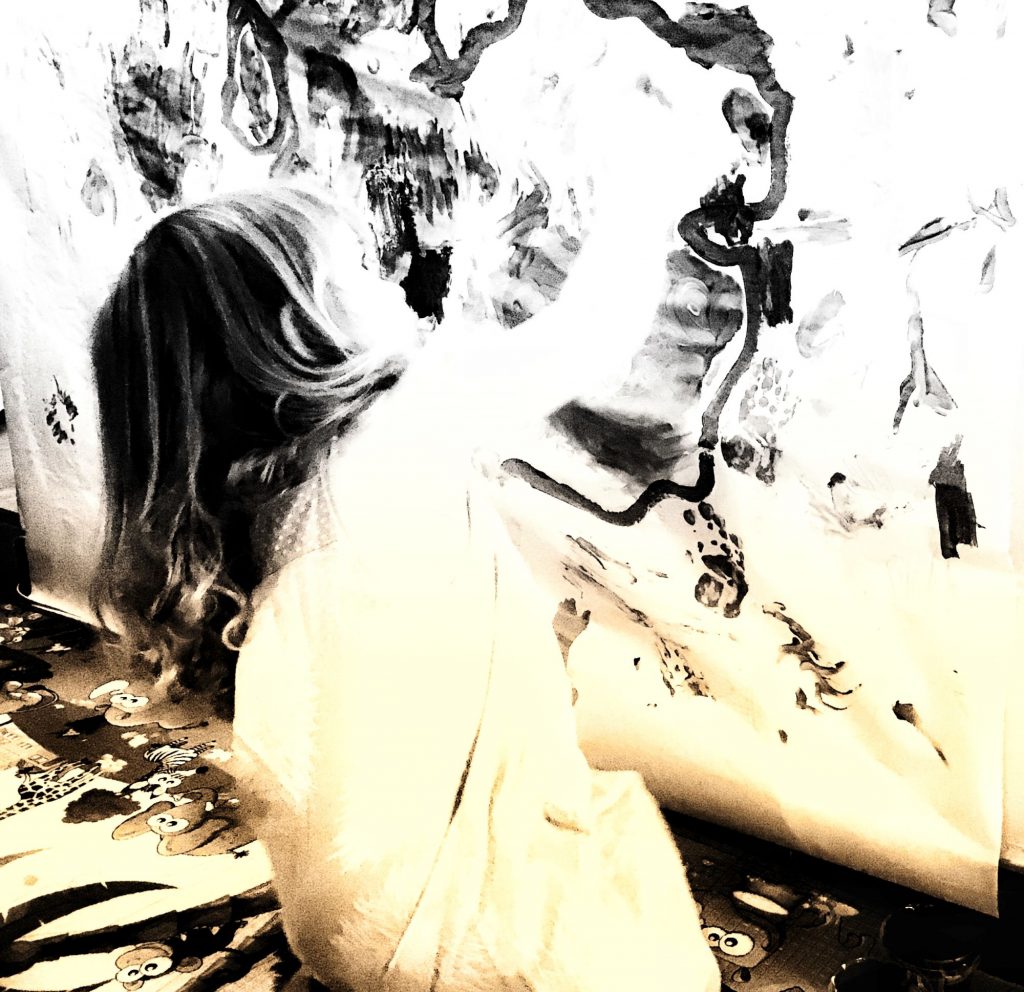
It is often with the birth of our own children that we start giving more attention to our selves. Our children start reflecting our own inner traumas from the given age.
In a way we are thus pressed by circumstances to examining our inner child, as our reactions to our children surprise us and we realize it is our own pain behind them. Our automatic reactions often take our breath away and when we look back at our day, we want to deal with the situations with our children differently.
Reactions to Children and Relatives as Gates to Ourselves
Most of us want to live mindfully and teach our children the same. We want to experience joy and treat children with respect and love and yet some surprising reactions get into our communication with them. And those are the gates to something amazing.
Our closest relationships with partners and children and other people in the closest circle quickly show us places we had no idea we have in us. Our reactions and triggers of strong emotions are in fact always a beautiful possibility to get on the treatment path and to dissolve one’s childhood traumas.
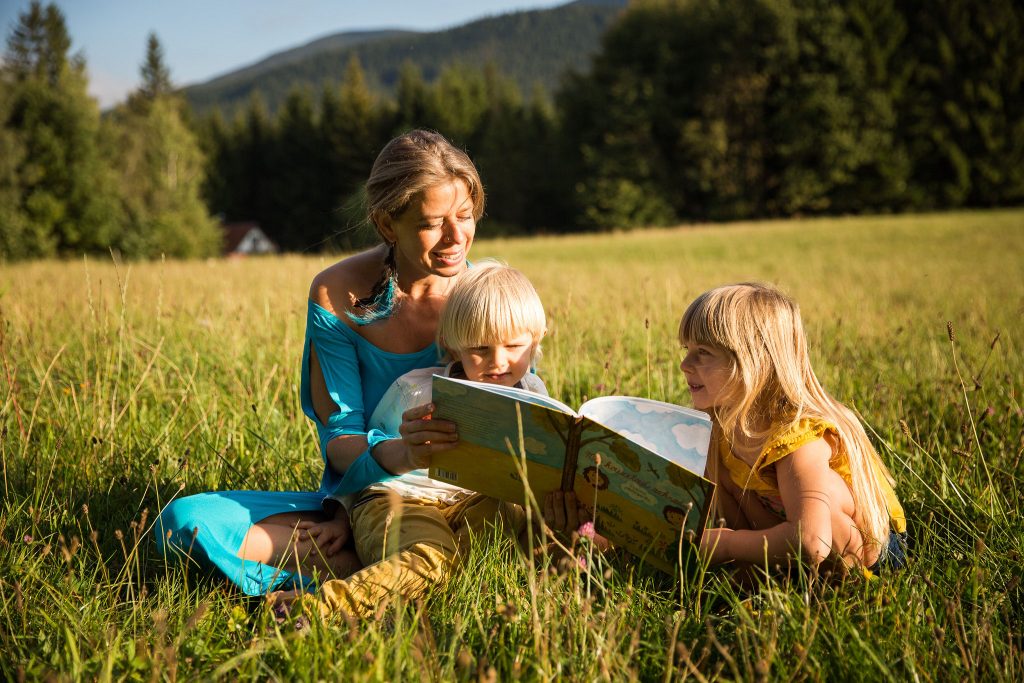
And so children become wonderful guides to our selves, to deeper self-exploration and to bigger freedom in our reactions, to feeling emotions and finally to experiencing relief and joy, which is the basis of all emotions and perceptions, in a better way.
What is Childhood Trauma? And What Actually Is Trauma?
What kind of trauma can we carry inside ourselves – we had an amazing childhood, we experienced nothing bad, so why do our close ones still sometimes trigger immature reactions?
“Trauma is not about what happened to you but about what happened inside you as an outcome of what happened to you.”
Gabor Maté
Trauma is not only a result of something external, something that happened to us, it is also a state of our body and psyché
Almost every problem of ours has roots in the fact we got disconnected from our selves to a certain degree. Be it a problem of depressions, anxiety, eating disorder, addictions, ADHD or any autoimmunity disorder, cancer, or chronic inflammations of even skin or muscles. Most of our problems go back to our childhood.

I personally lead courses of mindful parenthood and the course always starts with a realization of how many times a day we catch ourselves in the autopilot mode.
Many times a day, we realize we are not perceiving the current moment and what is happening with our body and our mind but our thoughts are in the future or we are running in a wheel of constant activity and automatic reactions.
And it is this mindfulness and the desire to be here and now, to be fully present with children in a respecting relationship that is often the entry gate to realizing an older pain inside of us. It is a path to start working with one’s own trauma.
But what exactly is trauma? Perhaps you thought trauma means having experienced some terrible thing that left traces?
.
“TRAUMA IS NOT ONLY ABOUT WHAT HAPPENED AND SHOULDN’T HAVE. IT IS ALSO ABOUT WHAT HASN’T HAPPENED AND SHOULD HAVE.”
Yes, it could be that. But trauma is rather a state in our body and psyché after some event took place. And it doesn’t have to be some “really serious” event. It could be any emotion that arose in us in our childhood but we were left alone to deal with it. Yes, it is often that simple.
Or our parents did not believe us our emotions, couldn’t accept them, validate them and experience them with us. We felt we were somehow wrong to feel sadness, anger or fear. And so if a child being a baby has no option to escape or fight the situation, they naturally freeze. We suppress our emotions inside and do not feel. They are overloading us.

Then we choose various coping strategies, for dealing with similar situations or how to prevent them or how to calm ourselves.
In trauma, it is always primarily about disconnecting oneself from one’s self. From one’s “I”. So, behind some experienced trauma there is always a primary trauma that had made us vulnerable. And the primary trauma was the disconnection from a caring person, usually from a parent. This is the very beginning of trauma.
“At the beginning there is a disconnection from the closest person that leads to a disconnection from one’s self.”
Sometimes it is not just that the child feels to be alone with their emotions and feelings but it could be also about their parents not believing them or belittling their perception of the world.
“There is nothing you should cry for, it is nonsense, good girls don’t get angry like this.” and the like.
Sometimes parents do believe the child’s emotions but cannot sate them, help them to manage their emotions.
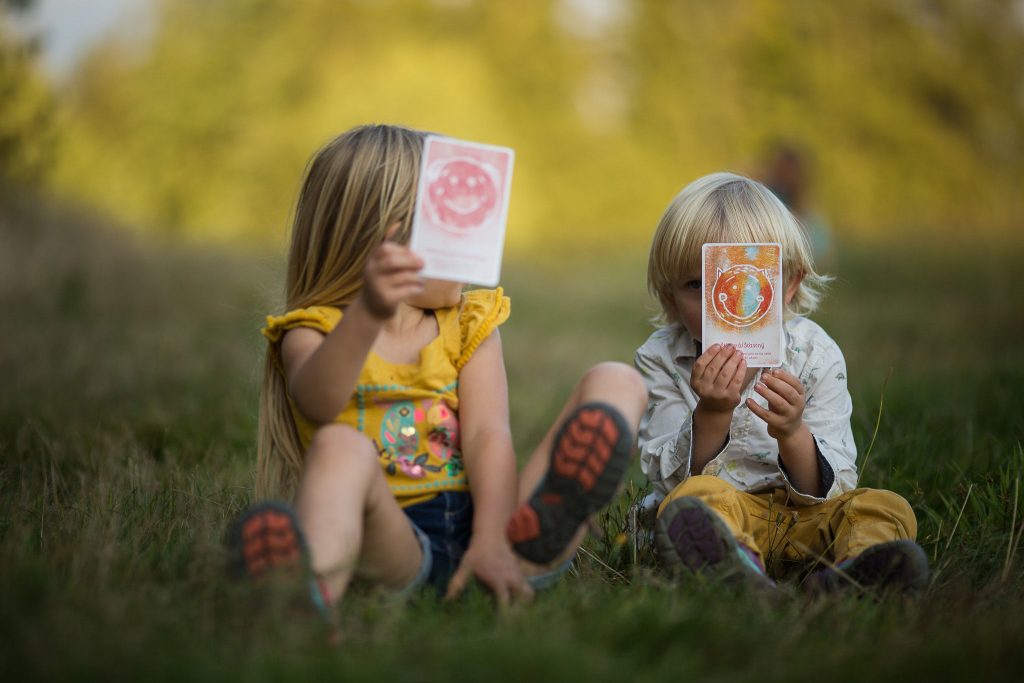
“If a child has nobody to share things with, they can do nothing about some things, they cannot fight back and cannot tell anybody about them – how can they manage the situation then?” They disconnect from themselves in order not to feel the unpleasant emotions and perceptions.
THE ESSENCE OF TRAUMA IS IN THE DISCONNECTION FROM ONE’S SELF ON THE EMOTIONAL LEVEL
This is why we often don’t know how we actually feel. We are disconnected from our bodies.
So, trauma not only limits our ability to feel our own body but it also disrupts our ability and capacity to control our reactions. Trauma predestines us to more predictable automatic reactions. The more traumatized we are the more limited and stereotypical our reactions will be.
Trauma simply always reduces our view of the world.
TRAUMA LOCKS THE PATH TO BEING IN THE PRESENT
Now we are getting to why due to trauma it is so difficult to be fully in the present. It is one of the coping strategies that we learnt when it was so hard to remain in the present.
Trauma makes us a prisoner of our own past to a degree; our reactions are not reactions to the present situation but they are adopted coping strategies and our patterns predestine us to a certain way of looking at and understanding nowadays situations.
In a way we are slaves of our own adaptations that served us well at some point but now became so unconscious we do not even check if they serve us good or not.

What is most difficult about it is that the primary trauma originates in our childhood but the resulting pain keeps making new traumas of it in a snowball effect.
That is why even the smallest trigger can activate our original trauma.
Trauma Changes Our Neural System
Last but not least it changes the setting of our neural system keeping us constantly in the mode of fighting, fleeing, or paralysis. When a situation arises, this manifests in our quick assumption of a defence position or that we attack. We feel like we are constantly being attacked, even when we are not. Or we do not recognize danger, even if it really is there.
TRAUMA CHANGES OUR REACTIONS TO DANGER AND OUR PERCEPTION OF SAFETY.
So, our neural system leaves us constantly on guard and we are constantly ready to fight. And as we are on guard all the time, some higher brain centres of the pre-frontal cortex are not available to us, whose circuits can, as a matter of fact, be nicely trained by meditation and like.
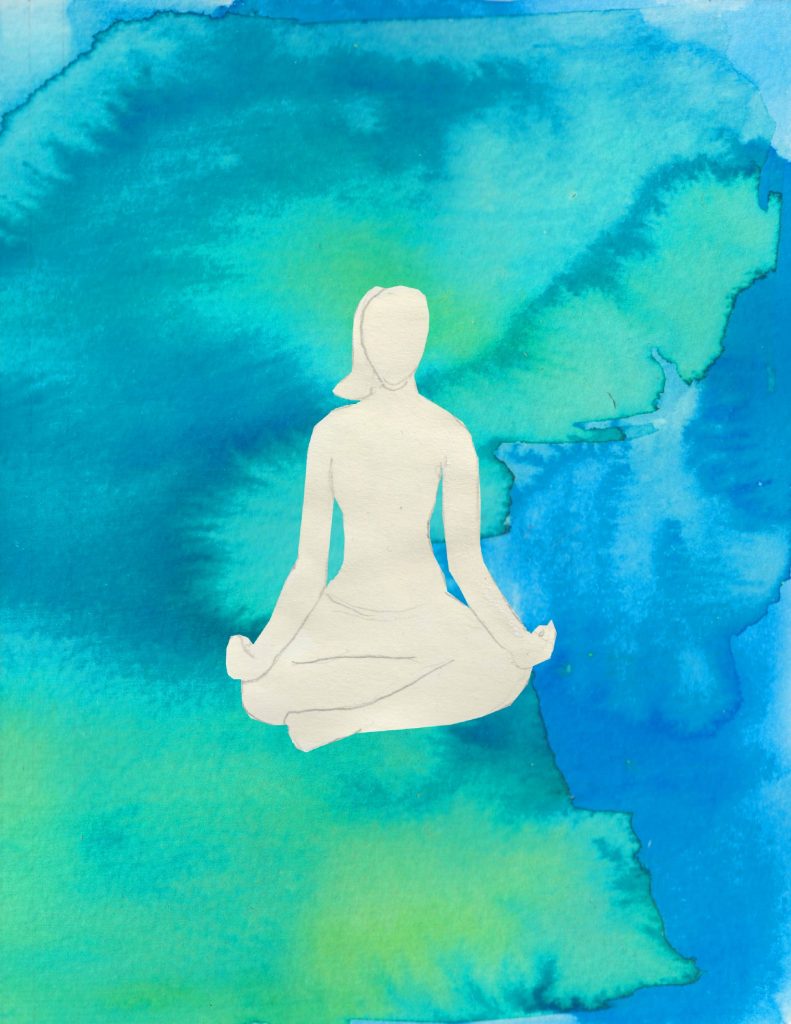
Thus, our reactions to danger are often rather inappropriate.
Even if our neural system is naturally pre-set differently from our childhood, it could always, together with how our brain functions, be re-set by a systematic work with it.
.
Trauma Changes Relationships
In a way, trauma always limits us in our future reactions, growth, and starting relationships. Our natural growth is stopped by trauma. Trauma forms our relationships and how we start them.
Trauma limits our capacity to establish healthy relationships. We either stay away from people or we do not listen to our intuition and choose wrong partners. Or we stay in toxic situations and relationships for too long.

Trauma really influences relationships in many ways but it can be a simple thing of tending to creating some dramas. These are life-long matters, they stay with us until we do some work on them.
Why do so many us look for authenticity and why have we lost it in the first place?
Because trauma is not only about what has happened to us and should not have but also about the fact that some things in our development have not taken place that should have. And such “thing” can be just a simple acceptance of all emotions.
How many times have we heard in our childhood: “Stop crying, you have nothing to cry for!” “Please stop throwing a fit, nothing is happening.” “Hope you are not going to cry for such a trifle.” “You don’t look so nice when frowning, it will stick with you.” And so on.
All this tells us we are not allowed to feel what we feel. As children, we are not accepted as we are with what we feel. And we perceive it as something that disrupts the relationships with our closest ones.
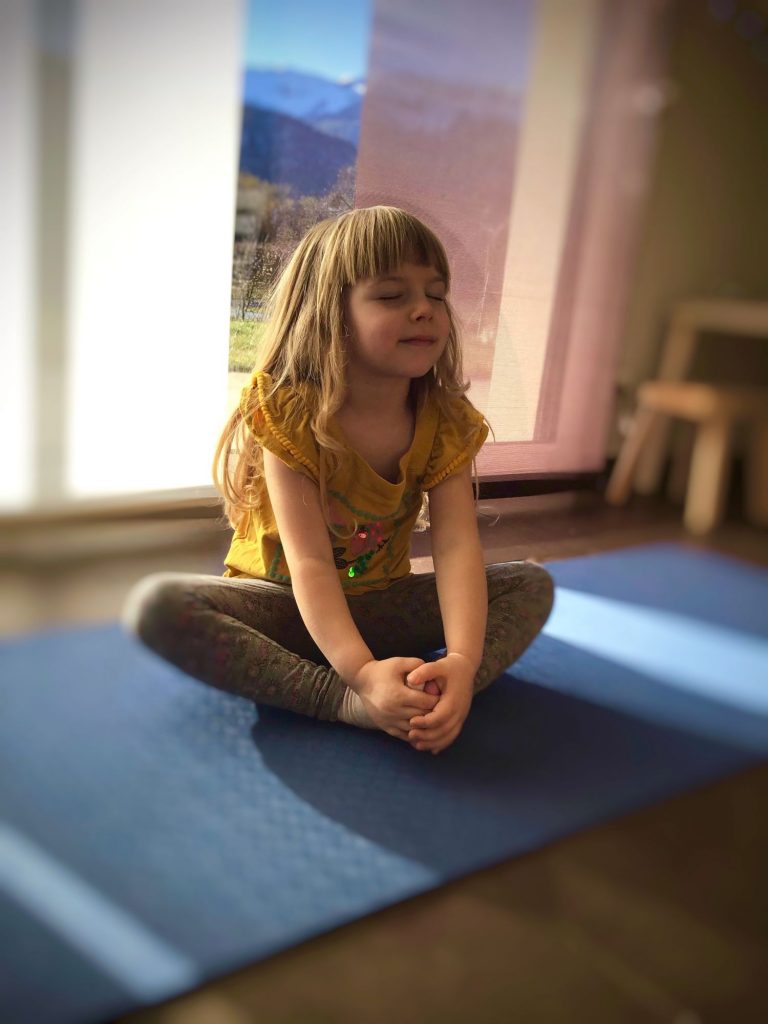
Oftentimes, we simply lacked the space to feel what we felt. We missed a parent that would in a way endure and hold our emotions. That is not our parents’ fault. They themselves could not feel emotions and had them suppressed in themselves. This way trauma is often passed on from one generation to another.
As a consequence, in our childhood we developed a strategy to supress and not to feel these emotions. Gradually, we disconnected from our own essence and from perceiving through the whole body. We disconnected from our nature in order to preserve the relationship with our parents. To be accepted by our parents, loved, or often simply to survive within the family.
Gradually, we disconnected from our own essence and from perceiving through the whole body.
In childhood we would always give preference to a relationship at the expense of our authenticity. But the strategies we developed back then have remained in our lives as various coping mechanisms without us knowing about them. Be it incredible solicitousness and kindness to others, the inability to say no to others or workaholism or substituting feeling emotions with eating.
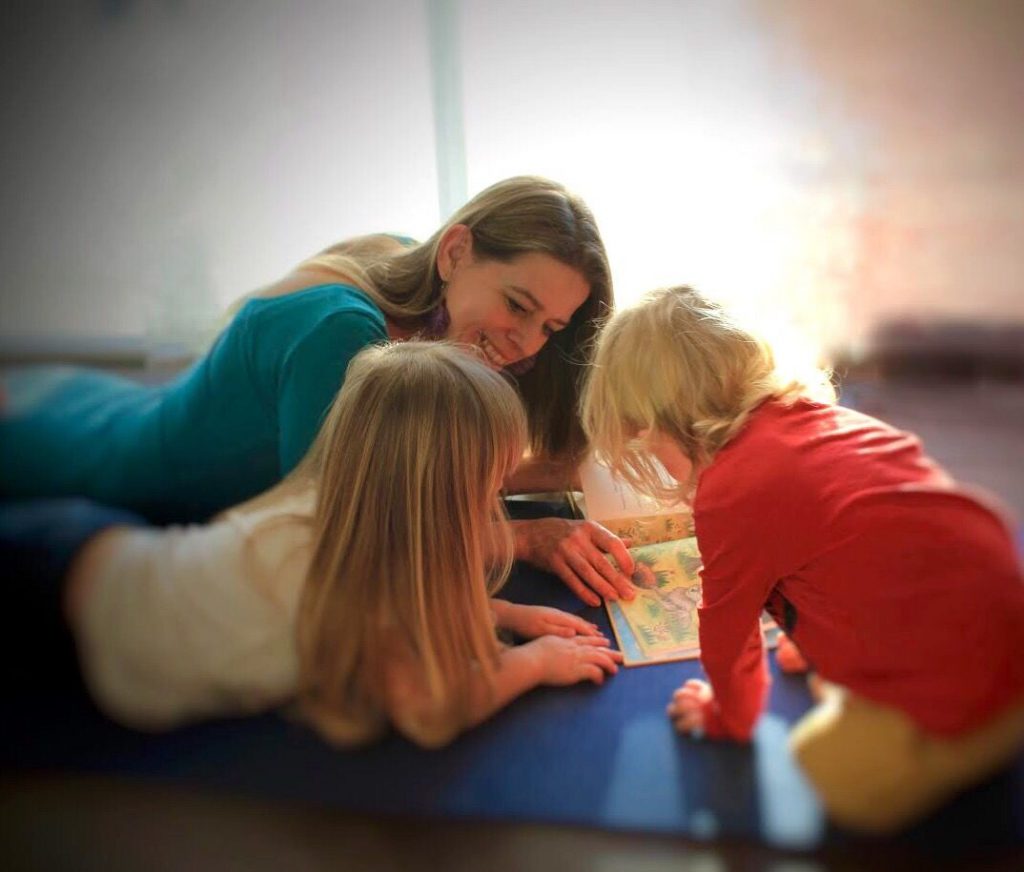
All these are strategies that used to help us not to feel and that do not serve us in the adult life and often stand in the way. But we are not aware of them.
Striving for not feeling emotions is what governs us.
The result is we are afraid of emotions, we often fear we would be consumed and controlled by them. But the very effort not to feel is what governs and controls us.
And these emotions seep to the surface in any of our close relationships. Be it with our partners, friends, or with children.
Trauma Makes Body Prone to Inflammation
From the physiology point of view, trauma can make body more prone to inflammation. There is a higher probability of illnesses where inflammation is the root cause. The inflammation markers are chronically higher in traumatized people. These people are also more prone to illnesses such as cancer, heart disease, autoimmune illnesses etc. Basically, trauma influences many layers of our living.
Trauma Causes Unpleasant Emotional States
When we were kids, we needed parents to regulate our emotional states, as child does not yet have a fully developed brain for regulating their own emotions.
So, if there was anything hard, as children we would cry to call our parents and if they came and managed to comfort us, to regulate our neural system and the internal experience, we learnt that the emotional states, even if unpleasant, they come and go. And we can manage them and if we cannot, we can ask for help.
But if there was nobody there for us in those difficult situations, we felt the unpleasant feelings would never end.

How do parent’s emotions influence a child?
A child is aware not only of its body but also feels tension and stress, inflexibility and pain in the body of its mother. Thus, when the mother suffers, the child suffers with her and the child’s pain cannot be anyhow alleviated. Because the body, in order to relief pain, needs to be “held” and the child needs to be ensured the unpleasant thing they are experiencing, will pass.
So, if the mother is traumatized or in stress, the child lacks this “holding”, comforting, and the pain stays in the child.
Gabor Maté
This is why many of us who did not grow up in an environment that would support us in our emotions and unpleasant states, where parents were not supportive, as they themselves were traumatized, started to fear in the childhood these emotions would stay with us forever.
And now, same as before but unconsciously, we still fear we would stay imprisoned in them and will never get out of them. It must be clear to you what we as children did with emotions in such unpleasant moments.
Gradually, we developed a collection of behaviors helping us to get out of these states. We came up with so called coping strategies out of which we basically built up our personality.
And then we think it is us. The collection of coping strategies and adaptations to various situations.
So, if parents cannot help us managing our emotions (not because they would not love us but because their own matters and traumas stand in the way), one of our options to cope is to try and do anything to keep our relationship with them working. Which may become a pattern for us.

These coping strategies may become our personality. But they are not us. We had to create all this because we needed to disconnect from how we were actually feeling and experiencing situations.
CHILD’S SELF-IMAGE IS CREATED BASED ON MIRRORING A PARENT.
If a parent is “broken” and traumatized, the child’s image of itself is distorted. The child will believe all their parent’s dysfunctions are the child’s own fault. And their unconscious pattern will be that they must have done something wrong or they are not good enough.
It follows that the way we as children in early years adapted to stress, trauma, etc., this helps us endure difficult moments. But the same patterns and coping strategies would later become the source of dysfunctions and addictions.
This is the root of nearly all mental illnesses and of many illnesses of the body. What helped us manage some situations in our childhood later becomes a problem.
Why a Present Parent Is So Important for the Child
If we were left alone with our feelings in our childhood, these situations would become the source of our trauma. Because isolation is traumatizing. It doesn’t have to be only about the fact we were left alone with unpleasant feelings; it could be about our parent not believing us. If a parent does not believe the child their feelings, the child may start believing their experiencing and they themselves are not important.
If a parent does not believe the child their feelings, the child may start believing their experiencing and they themselves are not important.
A parent is everything for a child, as a child does not have their own inner resources for coping with difficult situations and emotions. And so if a parent is not able to be there for the child, the child suppresses their emotions. But also starts using various behaviors that help in such situations. We call this behavior adaptation.
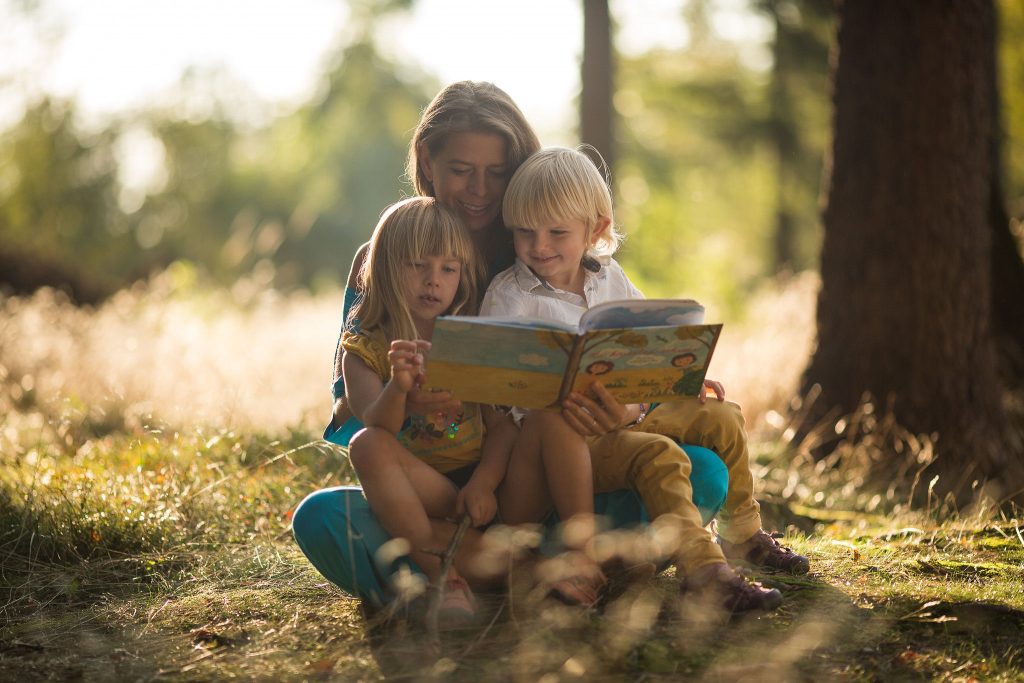
They start eating to compensate for unpleasant feelings or decide to become a super kind and nice person, so that such a situation is never repeated in the future.
And all these strategies and our own patterns we had to develop because we needed to disconnect from what we were really experiencing. Then what used to be an adaptation strategy in our childhood becomes a maladaptive strategy in our adult life. And this is how our personality is formed.
What Is a Personality?
Personality is in essence a collection of various qualities covered by a mask or in fact a bunch of coping mechanisms. The bad thing is we believe these are us!
In therapy with our clients we together recognize their adaptations that can often cause problems in their lives, bring about illnesses, or simply they get in their way. The core of my work is to bring my clients back to their essence, to their true Self. I bring them back to whom they used to be before they appropriated all these things.

Because adaptations might present obstacles in many people’s lives, making their life uneasy. Even addiction is an adaptation. Because it is always about an attempt to manage unpleasant feelings, to calm oneself down and replace unpleasant feelings with pleasant ones.
What has become our secondary adaptation, is the behaviour we adopted in order not to feel what we then felt for the first time as children.
My intention is to gradually write more about trauma, but let us summarize at least what we have talked about today and how to actually deal with trauma, how to treat it.
- TRAUMA PREVENTS US FROM RESPONDING TO THE PRESENT, WE ALWAYS REACT FROM THE PAST
- TRAUMA DISCONNECTS US FROM THE FEELING OF ONE’S OWN VALUE, FROM OUR ESSENCE (we then act from a position where our value is easily threatened).
- EACH MECHANISM, BEHAVIOR, DEFENCE THAT STANDS IN THE WAY IN OUR LIVES TODAY, STARTED AS A COPING MECHANISM THAT HELPED US IN OUR CHILDHOOD.
- TRAUMA IS BASICALLY THE CORE OF MOST ILLNESSES, IT IS A DISCONNECTION FROM ONE’S SELF.
- THE PAST IS NOT IMPORTANT, IT ONLY SHEDS LIGHT ON WHAT IS HAPPENING NOW. BUT THE DISCONNECTION ALWAYS MANIFESTS HERE AND NOW.
In Working with Emotions, It Is Always About Recognizing the Emotion but Not Identifying with It.
And What is the Inner Child and How to Actually Meet It?
At the beginning I wrote about my own suppressed emotions and meeting my inner child. With clients we go back to suppressed emotions and the parts of ourselves that were not given what they needed in the childhood.
These parts of ours are our inner children.
And as every child has needs that must be fulfilled otherwise they deviate from a healthy growth, even our inner children should have their paths. The way we coped with how our closest ones were not tuned to us in our childhood is the base of our patterns, coping mechanisms and defenses.

Each child has a need to be perceived and seen the way they are, they need attention of their parents and in the first years especially safety, firm hold, comforting, and the parent’s presence. The degree to which our basic needs were not fulfilled, not because our parents did not love us but because they themselves were stressed or traumatized and disconnected from themselves, reflects in our personality.
Each child has a need to be perceived and seen the way they are, they need attention of their parents and in the first years especially safety, firm hold, comforting, and the parent’s presence.
Based on coping with situations when a firm connection of a parent to us was missing, we ourselves disconnected from our selves and created our schemes and patterns. And now being adults, we can become the parents tuned to our inner children, and perceive and sate the needs of these parts of ourselves. We can fully be here for perceiving their emotions that they could never express and so they rather suppressed them.
HOW CAN YOU TELL YOUR INNER CHILD NEEDS YOUR ATTENTION?
Our full attention and being in the present with them can heal them and free them from the prison of unconsciousness, where these inner children were pushed in our psyché.

You can now agree on a signal with those parts of your selves with which they can let us know that it is just now when they need a minute of attention, this moment they can be here and now with us, completely the way they are with all their needs, and we can listen to them closely.
And my inner child feels like daubing colors on a cake and laugh and just be and so I am going to take its advice. You can read about the way I work with clients in healing traumas in my next article.
What does your inner child need now, in order to feel seen, heard and satisfied?
Write your ideas on the topic to me and tell me what your experience with trauma and working with one’s inner parts is. Looking forward!
